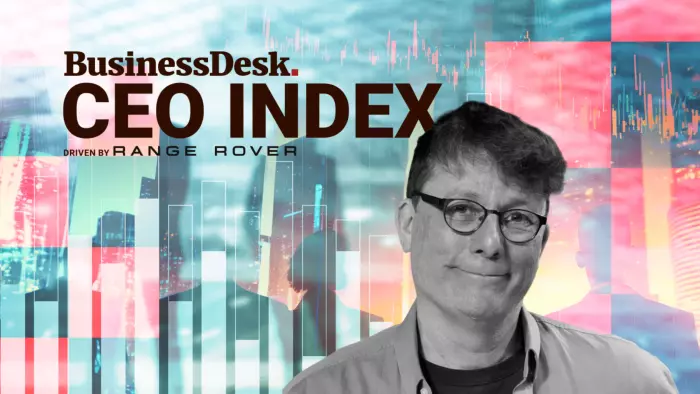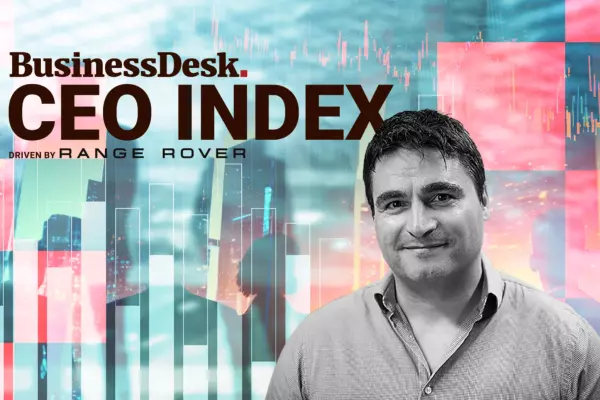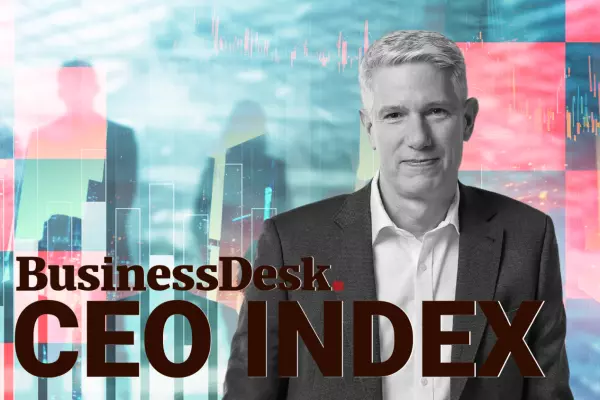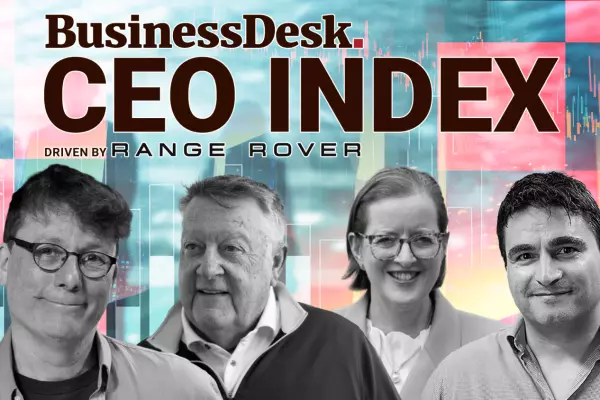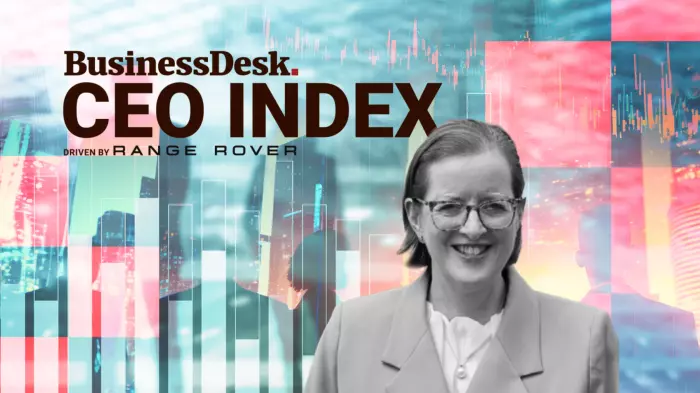Unusually for a New Zealand CEO, the ebullient face of Wētā Workshop’s Richard Taylor is well known in most Kiwi households. We’ve all cheered him on, as – grinning from ear to ear and flamboyantly dressed – he accepts another Oscar in a good, strong, Kiwi accent.
Taylor and Wētā Workshop, the company he and wife Tania Rodger run, first became known to the public when he and his team of creatives were enlisted to work with Peter Jackson on The Lord of the Rings (LOTR) movie trilogy, which began in 2001.
Wētā Workshop created thousands of props, costumes, prosthetics, miniatures, and weapons.
Themed experiences
As creatives working in Wellington, Taylor and Jackson’s paths had crossed in the mid-1980s, Taylor attracting the film-maker's attention with his innovative puppet-making.
The reach of Wētā Workshop, founded in 1987, has gone far beyond LOTR and The Hobbit: An Unexpected Journey. Its work can also be seen in the Avatar movies from 2009 on, and its game design division created the world’s first mixed-reality game in 2012, Dr Grordbort’s Invaders.
The Miramar-based company is also behind a number of well-known themed experiences, which represent 40% of Wētā Workshop’s portfolio.
It covers theme parks, immersive experiences, museums, and animal parks, ranging from the Te Papa “Scale of Our War” exhibition to a recent museum of traditional Chinese medicine in China.
Five Oscars, four Baftas
The British-born Taylor is on a plane every few weeks, slogging away, selling NZ to the world and bringing in business to this country and his team.
The CEO and chief creative officer is proud of the fact that Wētā Workshop has won five Oscars in three different disciplines – visual effects, costume and makeup. It's also won four Baftas.
“It speaks to the 'Jack and Jill of all trades' mentality of Kiwis and the willingness of Kiwis just to give it a go,” he says.
Taylor is the winner in the private company category of the inaugural BusinessDesk CEO Index. Our independent panel of judges ranked him highly as a creative business leader taking NZ Inc globally.
“Richard Taylor is someone who Kiwis are so delighted is making New Zealand and New Zealanders world famous,” the judges said. “He turns up for New Zealand. He’s created a premium brand that is sustainable and long term. He’s had a deep impact and supported the whole creative and NZ Inc expert sector.”
The judges said the hard-working CEO thinks differently about NZ and its economy. “It’s entrepreneurial guardianship.”
Leadership triumvirate
Wētā Workshop, like Sharesies, has three CEOs sharing the workload: Taylor, Rodger, and David Wilks, the general manager and chief operating officer, who has been with the company for 11 years.
Says Taylor: “I just no longer had the requisite breadth of skills to do it all myself. You have to remember we have seven different business centres under one roof.”
Those units are design; manufacture (including robotics and animatronics); immersive experiences; creative media; game studio; consumer products, and tourism, including Wētā Workshop Unleashed in Auckland and Wētā Workshop Experiences in Wellington.
The three CEOs each have their own areas of responsibility, but there’s also a lot of crossover, says Taylor.
“I have quite a bifurcated career in that I’m the chief creative officer here, but I also do a lot of travelling the world, looking for new work, setting up new opportunities, and acting as the frontperson for our company as relates to governmental, state, and local government levels … but then Dave also does a lot of that, too.”
Taylor is finding the three-CEO model works well for Wētā, and he appreciates that 3EO sounds like a Star Wars robot (C-3PO).
BusinessDesk asked him about his approaches to the judging panel’s key criteria of vision, impact, innovation, resilience, and influence, and he had a singular take on them.
Vision: Taylor says vision isn’t something he speaks to; aspiration is what he prefers to focus on.
“Our aspiration is to try to achieve creative immortality, and what I mean by that is that the only true immortals are the teachers of the world, right? They leave knowledge with the next generation, and that then gets carried through.”
Taylor would like to think the Wētā Workshop team are creating things that will have relevance after they pass away.
“You could argue that a lot of the work that we've already done, that a future generation may enjoy the work that we do,” he says.
This isn’t about arrogance. “It’s a desire to project an aspiration where the prop that we make for a film will ultimately become an artifact of the creative endeavours of a Kiwi working in New Zealand. I want us to tackle everything with a level of purpose that asserts the authority of something made well, something made with a passion, enthusiasm, and tenacity.”
Impact: How many times do you hear, "There’s no future in the arts, it’s better to pursue a traditional academic career?" Taylor asks.
“One of the things I am proud of is my unwavering commitment to try to show that creativity can be at the forefront of a New Zealand person’s life, and that creativity is a critical component for a healthy existence in the world,” he says.
“We’ve tried to build a company that gives the broadest spectrum of creatives the potential opportunity to work with us by offering a very broad array of different jobs,” he adds.
Taylor loves that Wētā Workshop has created an environment where people can “give it a go and see where they fit”.
Meanwhile, one of the critical components of a creative mind is to remain inquisitive and to observe the world, Taylor stresses. Every area of employment can benefit from critical thinking, he says.
“Whether they are working on a major museum project in China or a small horror movie in the South Island, it’s hopefully opening up their minds to be more inquisitive about the subject matter, and to be a critical thinker.”
Innovation: Taylor has a nuanced take on innovation. “Sitting downstairs, almost directly below my feet, is our senior leather worker. He’s been with us about 27 years, from the beginning of The Lord of the Rings. He will use the most cutting-edge digital manufacturing technology, through additive printing, waterjet cutting, laser cutting, whatever, while also using a tool that you can find in the hieroglyphs of Egypt.”
Taylor poses the question: Why would you ever throw out craftsmanship with the bathwater when craftsmanship is the fuel that allowed the innovation to be born.
One point of pride for him is that Wētā Workshop doesn’t keep its innovation under wraps.
“We’ve tried very hard in our career never to keep any secrets,” he says. “We’ve never patented anything. If a kid rings up at nighttime and asks for a formula for something, I will share it with them. Because you want to pass on knowledge – because, of course, we have learned from previous knowledge.”
Wētā Workshop is innovating new methodologies every day, Taylor says. “If there’s one critical component that has allowed us to stay in business in New Zealand, it’s our ability to innovate new methodology.
“It’s an imperative to us that everyone, while applying their craft-based skills to a task, continually thinks about how to advance that task to shave seconds off the process and make it tighter, faster, higher quality, and more creative.”
Resilience: Taylor says he faces micro challenges every day as a leader.
“We pursue between 120 and 150 projects a year around the world to win 10 to 12 projects. We may secure those 10 to 12 jobs, they may [sign a] contract, we may even begin work on them, and then some proportion of them will fall over during the year. The only certainty in our career is uncertainty.
“It's certainly not for the faint of heart what we do. And it requires an extraordinary level of dexterity, patience and passion from our senior management team to keep the business pivoting at a, if not weekly, definitely fortnightly to monthly level, to deal with the micro challenges.”
On a more macro level, tariffs have become a very significant tactical challenge, with 54% of all of the collectibles that Wētā Workshop sells going to America.
“The world economic and political landscape has quite a significant impact on us because we’re selling products into a lot of countries across the world,” says Taylor.
Wētā Workshop spreads its net wide internationally, and he has excellent relationships in China, where many businesses around the world are intensifying their energies in light of the US tariffs.
“I love the positivity of China, the positivity of the workforce of China. But our ultimate relationship with China will arguably be only as good as our government’s relationship with China,” he says. And that would be the case with South Korea or anywhere else Wētā Workshop wants to work.
As such, they’ve got to be everywhere all at once, says Taylor.
Influence: The Wētā Workshop CEO is spreading his energy and influence far and wide. “I mentor a large number of people. I have multiple relationships with educational institutions, including bringing Chinese students to New Zealand whom I personally mentor.”
Taylor says he tries to dedicate a big chunk of his “year’s energy” to trying to project the importance of NZ’s creative culture out to the world.
“Whenever I am out of the country, I am not speaking first of Wētā Workshop, I speak for New Zealand Inc, and then New Zealand’s creative culture, and then of our company,” he says.
A good book: The Hitchhiker’s Guide to the Galaxy by Douglas Adams. Says Taylor: “Adams writes that the art of flying is to throw yourself at the ground and miss. The fear of failure determines many people’s unwillingness to try new things. And I would argue that creativity and learning, and critical thinking, give you the tools to tackle risky things. Sometimes failing, sometimes succeeding, but always, with vigour, taking it on.”
Sliding doors: “If I had to choose another job,” says Taylor, "I would want to be a fine arts sculptor."
● BusinessDesk will publish a report on the overall winner of the CEO Index on Nov 19.
● Read more of the BusinessDesk CEO Index here.


